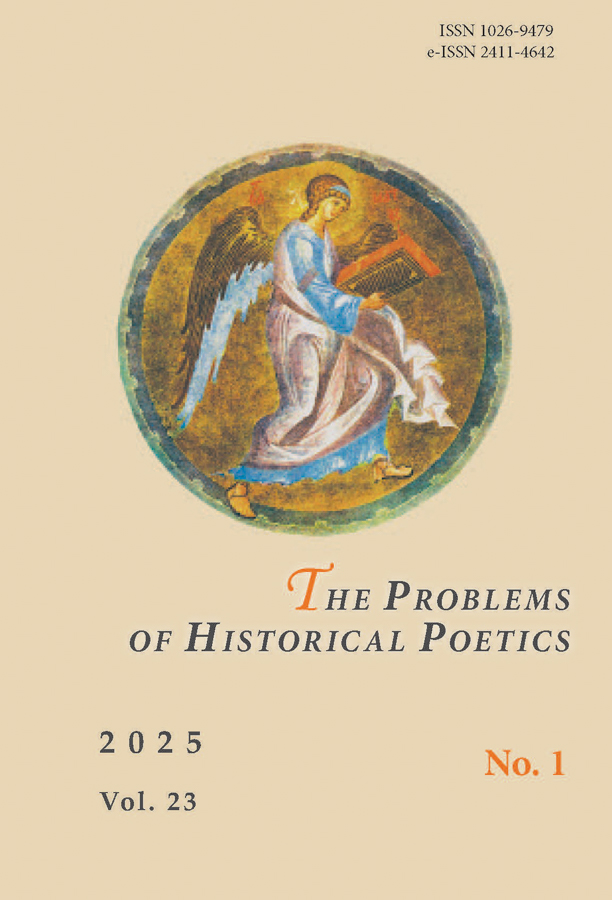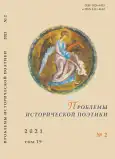The poetics of madness in Pushkin, Gogol, Dostoevsky (polemic notes)
- Authors: Zakharov V.N.1
-
Affiliations:
- Petrozavodsk State University
- Issue: Vol 19, No 2 (2021)
- Pages: 92-106
- Section: Articles
- URL: https://journal-vniispk.ru/1026-9479/article/view/284267
- DOI: https://doi.org/10.15393/j9.art.2021.9642
- ID: 284267
Cite item
Full Text
Abstract
Madness in life, philosophy, and art are different phenomena. In medicine, a madman is an insane person and a patient, in philosophy he is a sage, in literature — a poet. Doctors treat the patient, philosophers and poets admire the freedom of his thought and creativity. Problems arise when doctors turn into literary critics, and critics diagnose literary heroes. An absurd situation emerges when doctors diagnose those who are inherently unable to express a complaint, answer questions, undergo tests or pass a clinical examination. The article offers a critical analysis of the topic of insanity in the St. Petersburg-themed short novels by Pushkin, Gogol, and Dostoevsky, and offers a response to the question of which parts of their works belong to the poetic sphere, and which — to psychiatry. Pushkin and Gogol contributed to the poetic development of the theme of insanity, Dostoevsky revealed insanity as a mental illness where “higher meaning” manifests itself. All of these authors clearly defined the boundaries of troubled and healthy consciousness. Dostoevsky completed the transition from the poetic to the realistic interpretation of madness in Russian literature. A variety of concepts of insanity has been recognized in art, and there has been a creative competition between individual interpretations of this subject.
Keywords
About the authors
V. N. Zakharov
Petrozavodsk State University
Author for correspondence.
Email: vnz01@yandex.ru
ORCID iD: 0000-0002-2709-4145
PhD (Philology), Professor, Head of the Department of Classical Philology, Russian Literature and Journalism
Russian Federation, PetrozavodskReferences
- Gonzalez A. “The Living Corpse” and “The Double”, or Once Again About the Fantastika of Dostoevsky’s (Based on the Observations of the Translator). In: Problemy istoricheskoy poetiki [The Problems of Historical Poetics], 2016, issue 4, pp. 170–183. Available at: https://poetica.pro/files/redaktor_ pdf/1482757961.pdf (accessed on April 2, 2021). doi: 10.15393/j9.art.2016.3766 (In Russ.)
- Efremov V. S. Dostoevskiy: psikhiatriya i literatura [Dostoevsky: Psychiatry and Literature]. St. Petersburg, Dialekt Publ., 2006. 464 p. (In Russ.)
- Zakharov V. N. Problemy izucheniya Dostoevskogo [The Problems of Studying Dostoevsky]. Petrozavodsk, Petrozavodsk State University Publ., 1978. 110 p. (In Russ.)
- Zakharov V. N. Sistema zhanrov Dostoevskogo: tipologiya i poetika [The System of Genres of Dostoevsky: Typology and Poetics]. Leningrad, Leningrad State University Publ., 1985. 208 p. (In Russ.)
- Zakharov V. N. The Brilliance of the “Double”: Why Don’t Critics Understand Dostoevsky? In: Neizvestnyy Dostoevskiy [The Unknown Dostoevsky], 2020, no 3, p. 31–53. Available at: https://unknown-dostoevsky.ru/files/redaktor_ pdf/1606934799.pdf (accessed on April 2, 2021). doi: 10.15393/j10. art.2020.4941 (In Russ.)
- Zakharova O. V. From the History of Research on the Fantastika in the Russian Criticism and Literary Studies of the 1820s–1970s. In: Problemy istoricheskoy poetiki [The Problems of Historical Poetics], 2016, issue 4, pp. 100–117. Available at: https://poetica.pro/files/redaktor_pdf/1482755842. pdf (accessed on April 2, 2021). doi: 10.15393/j9.art.2016.3922 (In Russ.)
- Fokin S. L. Foucault and Dostoevsky: Insanity, History, Literature (A Book Review: Foucault M. Folie, langage, littérature. Paris, 2019). In: Novoe litera turnoe obozrenie, 2020, no. 3 (163), pp. 320–329. (In Russ.)
- Foucault M. Istoriya bezumiya v klassicheskuyu epokhu [The Нistory of In sanity in the Classical Era]. St. Petersburg, University Book Publ., 1997. 576 p. (In Russ.)
- Epstein M. Znak probela: o budushchem gumanitarnykh nauk [The Space Sign: on the Future of the Humanities]. Moscow, Novoe literaturnoe obozrenie Publ., 2004. 864 p. (In Russ.)
Supplementary files











